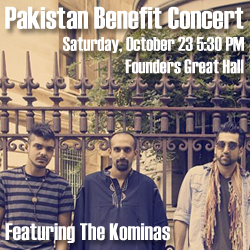Q&A: Waleed Shahid '13 on aiding flood relief efforts in Pakistan

Details
Haverford College: What inspired you to organize this concert?
Waleed Shahid: When a mostly rural region the size of Italy is submerged under water and people's livelihoods literally drown in front of them, you have to feel something, no matter where it is. Unfortunately Americans, and the international community in general, did not give as much to humanitarian relief efforts in Pakistan as they did to other recent natural disasters. A Brookings Institution study showed that the donation per affected person was $150 in Haiti and $15 in Pakistan.
The UN Secretary General Ban Ki-Moon said it was the worst disaster he had ever seen. More than a million homes were destroyed. More than 20 million people were/are injured and homeless. That's more than the devastating 2010 Haiti earthquake, the 2005 Kashmir earthquake, and the 2004 Indonesian tsunami combined.
It made me, and many others, think: Why? Why are certain social justice issues more "popular" than others? Why did Pakistanis, in relative terms, receive so little from the individual American donor? This is where there the politics of humanitarianism comes in. For example, many people from the so-called "liberal activist" camp advocated for donations by invoking the fear of the spread of fundamentalism in Pakistan and the resulting national security threat to our country. Others said that we shouldn't donate to Pakistan because the government was corrupt.
Why should the language of fear be used in a humanitarian cause? Many other governments of nations with lots of devastating humanitarian problems are also corrupt, why is Pakistan a different story? Why do we need to justify donations to a country because it is a "national security threat" when we don't in other situations.
HC: What do you hope to accomplish with the concert?
WS: This concert is a humble way to get at some of these very complicated issues. If the immediate response to the inspiring relief efforts after the Haitian earthquake taught me anything it was that little things count. At the end of the day, I just hope that people might get informed about the flooding, and question the images and stereotypes of Pakistan, Pakistanis, and Muslims, as well as the politics behind social justice and humanitarianism.
HC: What can we expect at the event?
WS: Among the performers are The Kominas. They're a group of Pakistani-Americans who play punk/rock music and make use of many Islamic/South Asian/Pakistani/Punjabi themes among others including Sufism, qawwali, and Islamophobia.
Arooj Aftab is a singer from Lahore, Pakistan who is currently attending Berklee College of Music. Her music makes use of the music of the Sufi mystical tradition in South Asia and puts a contemporary spin on it.
Andrew Mendelson is a sitarist from New York. He was recently featured in a documentary called A Cricket in the Court of Akbar [in which] he is the sole American competing in a sitar competition in Rajasthan, India.
Jamal Elias will be giving a short lecture titled "Imagining Pakistan." He is the Chair of the Department of Religious Studies at the University of Pennsylvania. He is about to come out with a book on spiritual space and religious imagination in Pakistani truck art and decoration.
Another speaker, Yousef Abdallah is the Operations Manager of the Northeast Office of Islamic Relief USA. He was recently in Pakistan conducting relief efforts. Islamic Relief USA is the organization we are planning to donate to. I think it's great that Haverford students will get to see what exactly they're donating to!
More information:http://www.haverford.edu/calendar/details/154131



